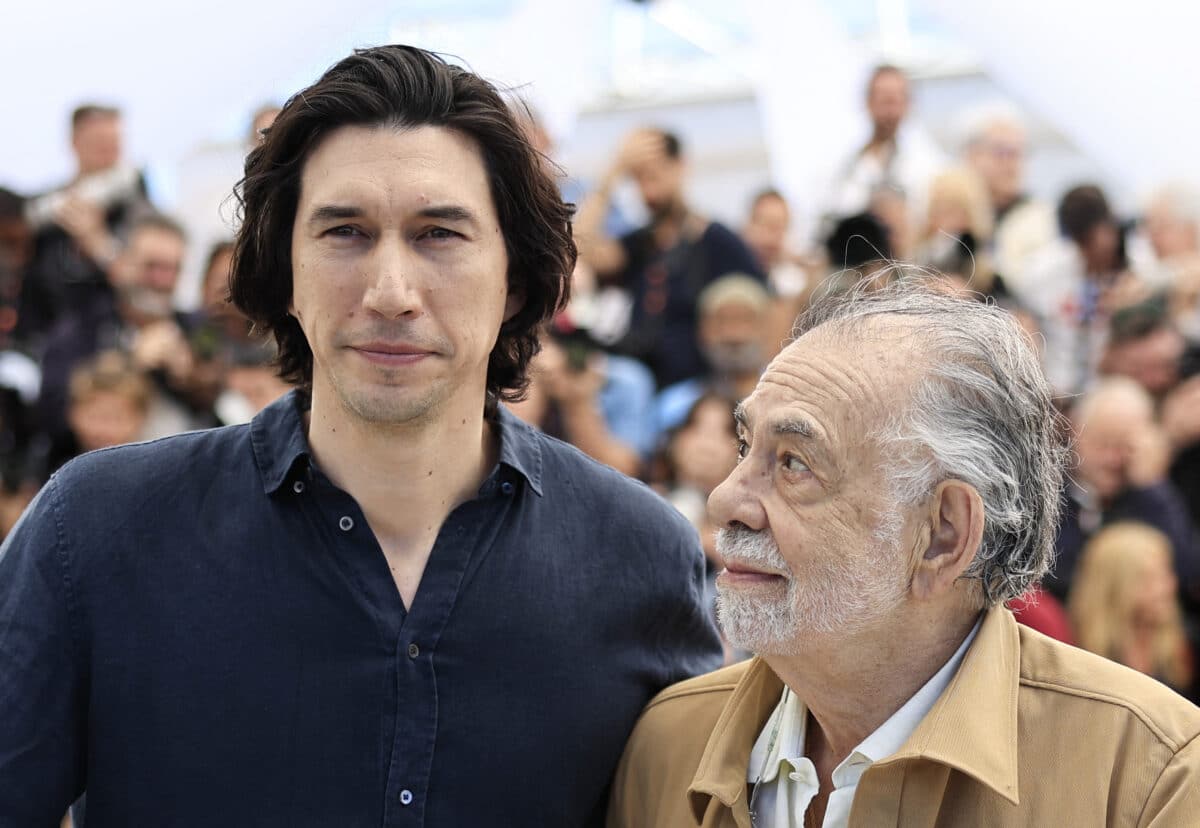Movie Reviews
New Francis Ford Coppola film trailer axed for using fake movie reviews

US director Francis Ford Coppola poses during a photocall for the film “Megalopolis” at the 77th edition of the Cannes Film Festival in Cannes, southern France, on May 17, 2024. (Photo by Valery HACHE / AFP)
A trailer promoting Francis Ford Coppola’s new film “Megalopolis” has been withdrawn after it was found to have incorporated fake movie reviews, reportedly generated by artificial intelligence.
Coppola’s wildly ambitious, decades-in-the-making movie, which hits theaters next month and stars Adam Driver, has starkly divided critics.
A trailer released this week drew parallels to earlier works by the revered Hollywood director that also initially left some professional reviewers cold before going on to become classics — suggesting “Megalopolis” can do the same.
“True genius is often misunderstood,” a voiceover began, before quotes from famous critics calling “The Godfather” a “sloppily self-indulgent movie” and “Apocalypse Now” a “spectacular failure” were presented on the screen.
The problem? None of those quotes were real.
Instead, the trailer appears to have used AI-generated imitations of the type of withering put-downs associated with renowned reviewers such as Pauline Kael.
In at least one case, a criticism appears to have been lifted from a review of an entirely different film
The trailer was quickly recalled, with Hollywood studio Lionsgate offering “our sincere apologies to the critics involved and to Francis Ford Coppola” for an “inexcusable error in our vetting process.”
“We screwed up. We are sorry,” said a statement.
Lionsgate has since parted company with the marketing consultant behind the trailer, trade outlet Variety said Friday. Meanwhile Deadline reported that the quotes were generated by AI.
The furor comes at a time when Hollywood is roiled by the encroaching impact of AI. Fears the technology could replace entertainment industry jobs — from actors to writers — were central to last summer’s devastating strikes.
The trailer episode is just the latest controversy to hit “Megalopolis,” an already hugely divisive epic.
Legendary director Coppola has said he spent $120 million of his own money to make the film, selling a stake in his California vineyard.
But its much-hyped world premiere at the Cannes Film Festival left the industry confounded.
Critics’ responses ranged from “a true modern masterwork” to a “catastrophe.”
Driver stars as a seemingly magical architect whose efforts to rebuild a decaying city into a futuristic utopia are thwarted by its resentful mayor (Giancarlo Esposito).

US actor Adam Driver (L) and US director Francis Ford Coppola pose during a photocall for the film “Megalopolis” at the 77th edition of the Cannes Film Festival in Cannes, southern France, on May 17, 2024. (Photo by Valery HACHE / AFP)
The movie also stars Aubrey Plaza, Shia LaBeouf and Dustin Hoffman.
It receives its North American premiere at the Toronto film festival next month, before being released in US theaters on September 27.
The controversy has provoked theories among some Hollywood observers that the entire unseemly debacle could have been staged to provoke headlines.
Lionsgate did not respond to an AFP request for comment.
But a source familiar with the marketing plan told AFP the studio did not deliberately fabricate the quotes, and removed the trailer as soon as it became aware of the situation.

Movie Reviews
Movie Review: 'Mufasa: The Lion King' – Catholic Review

NEW YORK (OSV News) – You don’t have to be Dr. Dolittle to understand what the animals are saying in the musical adventure “Mufasa: The Lion King” (Disney). That’s because director Barry Jenkins’ prequel to the popular franchise uses the same technology employed in the 2019 remake of the 1994 animated kick-off of the series to enable them to talk.
How much viewers will enjoy the varied creatures’ dialogue, however, is another question. The movie’s strong suit is visual rather than verbal and the upshot is a sweeping spectacle that lacks substance.
As narrated by Rafiki (voice of John Kani), a wise mandrill, the story looks back to the youthful bond between two princely lions, Mufasa (voice of Aaron Pierre) and Taka (voice of Kelvin Harrison Jr.). Though the duo quickly become friends, their situations are very different.
Taka is right at home under the protection of his royal parents, Queen Eshe (voice of Thandiwe Newton) and King Obasi (voiced by Lennie James). When Taka first encounters him, by contrast, Mufasa has been forcibly carried away by a sudden flood from his home, family and inheritance and is on the point of being eaten by crocodiles when Taka steps in to rescue him.
As their relationship flourishes, the pair treat each other as adoptive brothers. But plot complications — primarily involving Sarabi (voice of Tiffany Boone), a lioness they both befriend — eventually drive them apart.
Beyond the importance of unity and the corrupting effect of jealousy, there are few thematic elements to ponder as these events unfold. So viewers will have to be content with lush landscapes and some pleasant tunes from composer Lin-Manuel Miranda.
While free of objectionable elements, Jeff Nathanson’s script does flirt with shamanism and suggests that the dead achieve immortality through their influence on the living. Along with the numerous dangers through which the central characters pass, that may give some parents pause.
The film contains potentially frightening scenes of combat and peril. The OSV News classification is A-I — general patronage. The Motion Picture Association rating is PG — parental guidance suggested. Some material may not be suitable for children.
Read More Movie & TV Reviews
Movie Reviews
Identity Review | Expensive, Expansive and Excessively Complicated

One thing I have noticed about the scripts of Akhil Paul, one of the makers of the new Tovino Thomas starrer Identity, is how he notices certain peculiar things in stuff we see almost regularly. In movies like 7th Day and Forensic, he has used those details to deceive the audience or to deceive certain characters. When it comes to Identity, his third film as a writer and second film as a director, along with Anas Khan, the ambition is really huge. But somewhere, the convolutions of the story from being a simple revenge story to an almost Mission Impossible-level tragedy evading heroic thriller tires you. And rather than making us figure out how it all unfolded more subtly, Akhil and Anas are explaining everything less enticingly. While a part of you do appreciate the movie for being ambitious with the scale, the over-explained, complicated script reduces the wow factor of the film.
The trailer of the movie has not really revealed much about the film. So, I will try to keep it spoiler-free. But some spillings will be there, so be cautious. Haran Shankar is our hero who lives with his two sisters. Haran, who lived with his abusive father till the age of seven, has developed a very obsessive character trait. And since his late mother was a sketch artist in the police force, Haran knows the science of that as well. What we see in Identity are the events that happen in the life of Haran when a Bengaluru-based police officer becomes his neighbor in his apartment. The police officer is accompanied by a witness who is experiencing face blindness after a hit-and-run incident. How the sketch artist capabilities of Haran help these two and how that journey unfolds is what we see in Identity.
The agenda of the bad guy in this movie is so elaborate and meticulous that while I was driving back home after watching the movie, I was trying to think about the story in a linear way. So, when you look at the story from a linear point of view, the hero almost becomes a character who happens to be in a subplot of the villain’s story. See, people like Christopher Nolan and Dennis Villeneuve have also gone after complicated scripting methods to make the movie compelling for the viewers. Forget foreign films, one of my absolute favorites of last year, Kishkindha Kaandam, also made a linear story complicated to give us that cinematic high. The issue I felt with Identity is that the complications in the story and when they eventually get revealed, it feels more like a deliberate distraction rather than a well-crafted twist.
In terms of using minute details about professions or medical conditions, the writing is definitely great. From facial blindness to sketch artist psychology, and to flight protocols, one can see that the director duo have done really good research in bringing authenticity to subplots and set pieces they have imagined. But somewhere, I felt the theatrical euphoria you associate with the revealing of a twist was just not there in the directorial aspect of the film. And I feel a larger part of that is because of the spoon-feeding exposition through dialogues. We are not picking information from the scenes. It is more like we are getting informed about what really happened literally by some character.
The wider aspect ratio of the film gives it the option to make things look grand and slightly larger than life. And Akhil George plays with the color palette pretty effectively to give sequences a particular mood. A lot of back and forth is happening in the movie to reveal the twists, and Chaman Chacko uses aggressive cuts to make those portions work. The production quality of some of the chase sequences is pretty good. While the fight inside the flight made absolute sense, and the execution was really impressive, the car chase sequence felt slightly outlandish.
Tovino Thomas tries to follow this stiff body language to show the precision obsession of his character. While that style looked very stylish whenever he does that, along with dialogues, in the initial portions of the movie where he is mostly silent, that body language somewhat reminded me of Small Wonder. In an interview, when Akhil Paul was asked about the casting of Trisha in the film, he was sincere enough to say that the bigger budget of the movie made them cast a bigger name to widen the market. Well, that very much gives you an idea. Her character, Alisha, is important to the story. But in terms of scope to perform, it offers minimal opportunity to the actor. Vinay Rai, in his typical style, carries the tone shifts of the character effectively. After a point, Allen Jacob was all about swagger. Shammi Thilakan was perhaps the only performer who was able to reduce the rigidness of the dialogues through his dialog rendering. Aju Varghese gets a police role we really don’t see him play often.
In terms of scale and imagination, Identity definitely has managed to pull off an appreciable output on screen. At a time when people are willing to decode things on their own after watching a film, I thought a bit more refinement on a writing level would have made Identity a quality film by all means. Similar to what I said about Marco, despite these movies having shortcomings or issues, it is really promising to see that within the constraints of having a small market, our makers are trying ambitious stuff.
At a time when people are willing to decode things on their own after watching a film, I thought a bit more refinement on a writing level would have made Identity a quality film by all means.
Signal
Green: Recommended Content
Orange: The In-Between Ones Red: Not Recommended
Movie Reviews
Movie Review: Hollywood Veteran Nicole Kidman Returns to Erotic Drama in 'Babygirl'

After watching Christy Hall’s Daddio earlier this year and Halina Reijn’s Babygirl out this month, it’s clear that Hollywood has moved on from #metoo to conventional passion and eroticism in filmmaking.
After all the controversy over sexism, sexuality and power imbalances, one would assume female writers and directors would fully embrace the female gaze and make use of the collective step forward in our cultural narrative.
But both Daddio and now Babygirl make me feel like the opposite is happening — that women behind the camera are enabling the male gaze instead. And its not even in a satirical way either, but more of a resigned acceptance, strangely enough.
Twenty-five years following Stanley Kubrick’s Eyes Wide Shut (1999), Nicole Kidman returns to erotic drama with Babygirl as protagonist Romy Mathis, the CEO of a major tech-based corporation in contemporary New York City. At work and at home, she’s a successful and dedicated businesswoman, wife and mother.
But in private, she wishes that she could fulfill her sexual desires. When one of the new interns, confident and attractive Samuel (Harris Dickinson), shows an interest in Romy, she thinks he might be able to understand her needs in bed in ways her husband, playwright Jacob (Antonio Banderas), doesn’t.
Esther-Rose McGregor and Vaughan Reilly play Romy’s young daughters, and Sophie Wilde co-stars as her dedicated colleague.
In the promotion fo Babygirl, I was surprised Reijn didn’t name Jane Campion or Sofia Coppola as directors who have influenced her work, and mostly listed the more infamous male filmmakers of the 1980s erotic thrillers, like Paul Verhoeven, Brian De Palma and Adrian Lyne. But after watching Babygirl, it makes sense. There is virtually no message or theme to the film other than “giving into your immoral temptations might lead to consequences.”
None of the characters are interesting or likeable enough to follow for two hours, let alone deserve being redeemed by the end. Decisions by the characters are overly convenient to move the plot along, and the lack of male nudity compared to the graphic female nudity is distracting, especially from a film being marketed as erotica “for women.”
It feels like Reijn just enjoys shooting provocative sequences and not much else. It isn’t even that sexy or shocking. It left me wondering, “What’s the point? Some people can’t help being horny?” You could just go back and watch Campion’s The Piano (1993), Verhoeven’s Basic Instinct (1992) or Lawrence Kasdan’s Body Heat (1981) again if you want effective, well-executed eroticism in cinema.
Most disappointing to me are the two leads of Babygirl, both generally talented and mesmerizing, who have been better in other films. I felt Banderas was also wasted and underwritten as the perplexed, devoted husband.
Babygirl has an interesting plot and good cast, but it’s eroticism ultimately leads nowhere.
-
/cdn.vox-cdn.com/uploads/chorus_asset/file/25672934/Metaphor_Key_Art_Horizontal.png)
/cdn.vox-cdn.com/uploads/chorus_asset/file/25672934/Metaphor_Key_Art_Horizontal.png) Technology1 week ago
Technology1 week agoThere’s a reason Metaphor: ReFantanzio’s battle music sounds as cool as it does
-

 News1 week ago
News1 week agoFrance’s new premier selects Eric Lombard as finance minister
-

 Business1 week ago
Business1 week agoOn a quest for global domination, Chinese EV makers are upending Thailand's auto industry
-

 Health5 days ago
Health5 days agoNew Year life lessons from country star: 'Never forget where you came from'
-
/cdn.vox-cdn.com/uploads/chorus_asset/file/24982514/Quest_3_dock.jpg)
/cdn.vox-cdn.com/uploads/chorus_asset/file/24982514/Quest_3_dock.jpg) Technology5 days ago
Technology5 days agoMeta’s ‘software update issue’ has been breaking Quest headsets for weeks
-

 World1 week ago
World1 week agoPassenger plane crashes in Kazakhstan: Emergencies ministry
-

 Politics1 week ago
Politics1 week agoIt's official: Biden signs new law, designates bald eagle as 'national bird'
-

 Politics7 days ago
Politics7 days ago'Politics is bad for business.' Why Disney's Bob Iger is trying to avoid hot buttons













